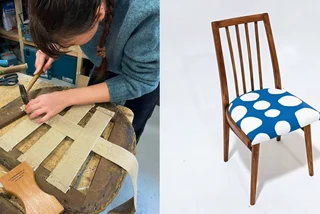Established by a mother of three bilingual children in 2011, Villa Luna International Kindergarten and Nursery School began with a dream: founder Olga Timková wanted to create a school in which children, parents, and teachers would feel happy, satisfied, and fully supported.
Timková believes bilingual education lays the foundation for success later in life – and that international schools help to create international children.
After more than ten years of working with children and families of all nationalities, Timková and the staff at Villa Luna share their key principles for creating early learners who are engaged and ready to take on the world as well as the most important reasons why international schools work best for international kids.
#1 Children’s well being is at the forefront
The school's principles are based on those of Belgian professor Ferre Laevers who theorized that a sense of well-being evokes a more connected learning experience.
"A child who feels satisfied and relaxed is able to immerse himself in exploring the world without fear of mistakes and failures. Only under these conditions will he or she reach the deepest level of learning and develop rapidly," writes Laevers.
#2 Learning is an adventure, not a chore
Timková says that solid pedagogical research shows that stimulating a child's desire to explore and discover is the fastest path to learning.
“One of the most playful and creative educational methods, enjoyed by teachers and children alike is harnessing the imagination through the project method,” she says.
One recent project saw Villa Luna students create a fantasy planet, inspired by “The Little Prince.” Merry astronauts made of paper and glittering materials and planets of various colors and designs took over the entire school.
#3 Diversity helps us all
In a multicultural environment, children are exposed to differences and are naturally open to them later on, Timková says.
“They learn empathy, respect, tolerance, and cooperation. A child who grows up in such an environment is given the ideal conditions to develop into a person equipped with important abilities that allow them to make the most of their potential in today's dynamically changing world.”
She believes that integration not only benefits the child but society as a whole.
"When we moved to Prague, we felt insecure. My daughter longed for friends but feared the language barriers,” Giovanna, mother of Chiara, a Villa Luna student from Italy. “When we came to the Bunnies class, my worries vanished. It was fascinating to watch the children communicate in the game, even if they are from all over the world.”
#4 Multilingualism matters now more than ever
It’s well known that being bilingual or multilingual brings many benefits down the road. Research shows that bilingual or multilingual people have improved attention, conflict resolution, the flexibility of thinking, and creativity.
“Bilinguals also tend to show greater social sensitivity because they still have to evaluate the communication language context and choose the right language for the given situation and the given communication partner,” says Timková.
Villa Luna uses the immersion method of learning a foreign language to teach its students German, English, and Czech. Timková says children learn two or more languages in a well-organized multilingual environment. She recalls a particular student:
"I remember Madeleine, who immigrated from Romania, and her parents spoke Romanian and French to her. At Villa Luna, she attended the Czech-German class. When she started primary school, she spoke all four languages and easily switched between them.”
#5 Teachers who are devoted to learning as much as they are to teaching
Only professional teachers can ensure a quality kindergarten education. Teachers should stimulate a desire for learning and discovery and at the same time, set rules and boundaries. They should be loving, empathetic, and respectful and the child should feel safe in their presence.
But there are other qualities that it’s important for teachers to have, says Timková: “They can’t lack a sense of humor and must be very open to further professional and personal growth.
In Villa Luna’s dedicated teaching room, groups of teachers meet to share their ideas, create new innovative new learning projects or discuss the ongoing development of individual students.
#6 A gentle approach to new students
In international kindergartens, new students come in on a regular basis. Timková says that one of the most common questions from parents enrolling a child is: “Anna is very fixed on me. We tried to get used to it, already in two kindergartens, but without success. How will you help her adapt?”
Timková believes that a successful and tear-free start to kindergarten requires great attention to adaptation. Careful preparation and regular communication with the parents, the aim of which is to learn as much as possible about the child before they enter the kindergarten, play a crucial role.
“Each child has different interests and comes to kindergarten with a different previous experience therefore the path to building trust in a new person and environment is individual for each child,” says Timková.
“The adaptation period that ends with a laughing child running from his mother to his classmates is always a small victory,” she adds.
#7 A curriculum that embraces lifelong learning
Villa Luna’s educational program “Come and explore the world with your friends" is the result of the joint effort of the teaching team, and reflects many years of experience.
Structured on the laws of developmental psychology and pedagogy, and developed over several years of experience it is structured into several focus areas and forms a solid base of the school's work.
“It’s intended to be a guide along the way to readying children for being independent, active, and healthy after leaving school,” says Timková.
The curriculum also enables creativity for every teacher.
As an example of some successful lesson plans that fall under this curriculum, Villa Luna teachers use book-themed lesson plans including “The Day the Crayons Quit,” “Pinocchio,” “Bird World,” “Robot Emil,” and many others to put education and entertainment on the same page.
#8 Extracurriculars all under one roof
Afternoon clubs are a Czech tradition and the tradition carries on in Villa Luna where the afternoon is just as lively as the morning. Around four o'clock extracurricular programs kick in, which entertain children and support the development of their interests.
Parents don’t have to worry about organizing after-school activities such as arts and crafts, dancing, sports, science, and yoga as they take place at Villa Luna under one roof.
#9 Careful assessment and monitoring of individual children
Starting school is an important milestone in a child's life, which is taken seriously at Villa Luna, says Timková.
“For teachers, a smooth entry into primary school is the culmination of their several years of work with a child in kindergarten. The fact that teachers know the child's personality, interests, and needs is the key to the child’s later success.”
Teacher Boris adds: "We have three teachers in a class so that we have time to devote ourselves to pedagogical observation and assessment. We observe children during activities, record their successes and challenges, and prepare a custom development plan for each of them.”
#10 Communication builds community
Villa Luna views the parent as the ultimate expert on their child and values close communication and cooperation for the most effective development of the student.
“Villa Luna is not only a school but also a place for meeting and conversation,” says Timková who adds that parents are frequently invited to join events or lectures with multicultural teachers.
"We found a new community in kindergarten. Here we meet parents of children from different countries, we are all in a similar situation and we have something to say. We are happy to cooperate at Villa Luna events for the whole family,” says Jürgen, father of 4-year-old Tobias.
“It is very important that parents and teachers pull together,” says Timková. “Seeing children and parents happy and feeling that we all have mutual trust is the greatest reward the Villa Luna team can receive.”
This article was written in association with Villa Luna. Read more about our sponsored content policy here.












 Reading time: 6 minutes
Reading time: 6 minutes 


































